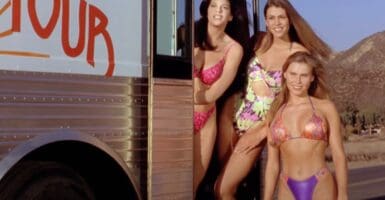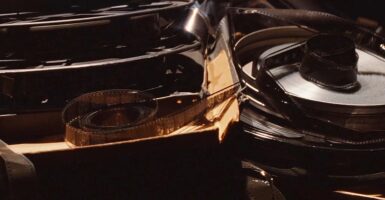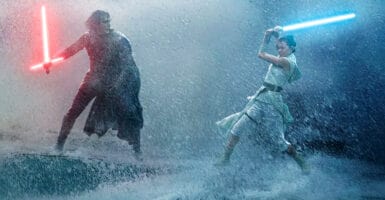Torchwood Writer On Where Miracle Day Went Wrong
This article is more than 2 years old
With Doctor Who celebrating its 50th anniversary this year, one of its little siblings unfortunately won’t be throwing any victory parties anytime soon. I speak, of course, of Torchwood, the Who spin-off featuring the adventures of the immortal Captain Jack Harkness and company. In spite of getting a big marketing push to woo American audiences for its run on Starz, Torchwood: Miracle Day was a disappointment both narratively and in the ratings department. One former Torchwood writer thinks he knows where Miracle Day went astray and lost its “essence.”

Writer Chris Chibnall has penned episodes of both Doctor Who and Torchwood, including recent Who episodes “The Power of Three” and “Dinosaurs on a Spaceship.” He wrote for Torchwood through season two, and though his involvement with Miracle Day was very limited, he thinks the Starz Torchwood run suffered from a serious identity crisis. Here’s Chibnall, speaking to Starburst Magazine:
Whether you like or dislike Torchwood, it has an essence – of madness and cheekiness and sexiness, and fun and darkness, those sort of polar facets of what it’s about, of putting those things together – and somehow it lost a bit of that somewhere in the process. When we were first talking about it, it was something a bit bolder, a bit cheekier. it may just come back to the fact that one of the great essences of Torchwood was taking those American tropes and doing them in Wales. And in a way, that’s what made Torchwood so brilliantly odd. Once you put it in California, it becomes more like other shows.
He hits on one of the biggest problems I had with Miracle Day: it was trying to serve two masters, and failed to serve either. It was attempting to service both the die-hard Torchwood fans and any new American viewers lured in by Starz’ shock-and-awe marketing in the months leading up to its premiere. Moving the show to American and introducing new characters American viewers might more easily identify with makes sense from a business standpoint, but attempting that balance seemed to leave Miracle Day unsteady and unsure of what it wanted to be, even in its best moments. (It also didn’t help that the pacing was sssslllllloooooooowwwwwww.)
Perhaps the most frustrating thing about Miracle Day, aside from the largely wasted potential, is that it left the series on a sour note that may never get rectified with a better ending. That’s doubly a shame, because the Children of Earth series that preceded it was across-the-board excellent, and left the (surviving) characters in a place of closure. It worked perfectly well as a series finale, certainly more so than Miracle Day. Chibnall is also free with praise for Children of Earth, and why he thinks it worked so well, both in and of itself and in comparison to Miracle Day:
When I was setting up Law & Order: UK, Russell and Julie kept saying, ‘Just come and do this little five-parter, and write this with Russell.’ So no, I had to turn that down a few times. I don’t regret it at all. I mean I think it’s brilliant and I think it’s the best iteration of Torchwood. But it also destroys everything about Torchwood; in order to make it work, you have to destroy the things that we were writing for, for two series: you destroy the Hub, you put them on the run, there’s no real sense of the Rift. So in a way, it’s a totally different format. And that’s what makes it work so brilliantly.
Sadly, the future looks pretty dim for Torchwood at the moment. Does Chibnall hold out any hope that creator Russell T Davies might eventually return to the world of Captain Jack? Don’t hold your breath. “It’s entirely down to Russell,” says Chibnall. “I would expect he will have other things he’ll want to write, to be honest.”
You can read the full Chibnall interview in Starburst Magazine.












